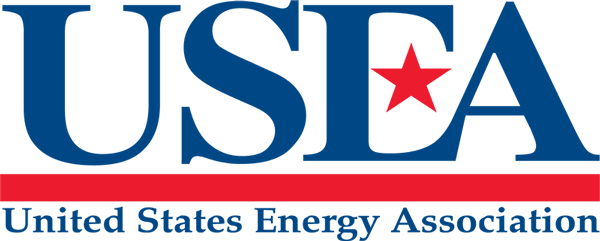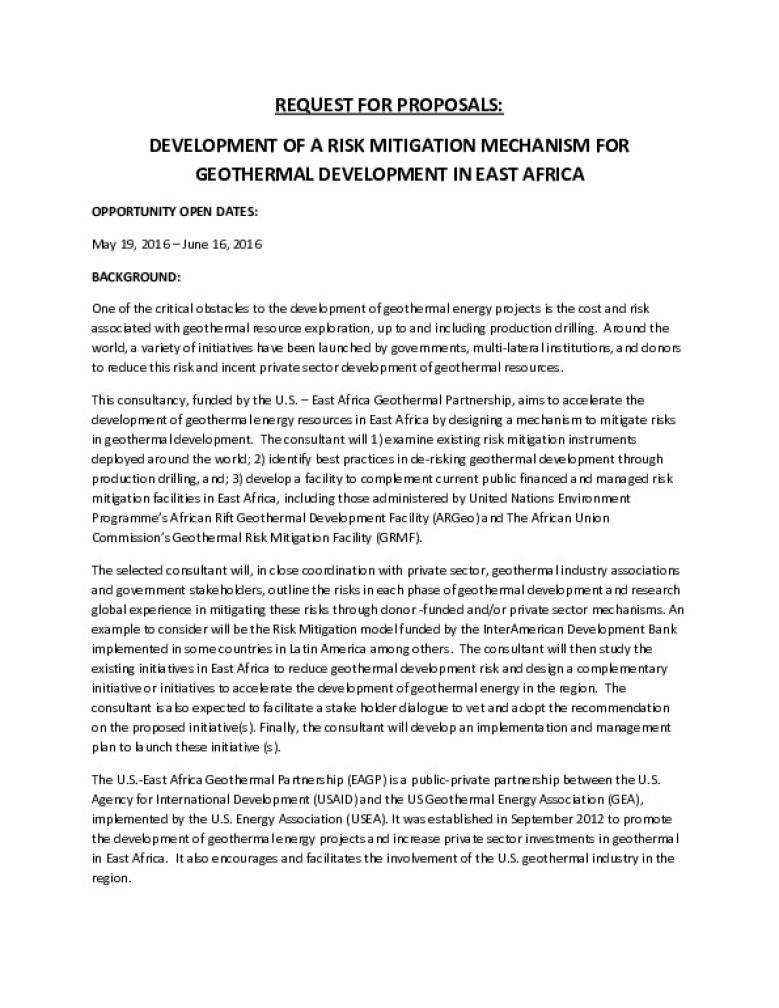REQUEST FOR PROPOSALS:
DEVELOPMENT OF A RISK MITIGATION MECHANISM FOR GEOTHERMAL DEVELOPMENT IN EAST AFRICA
OPPORTUNITY OPEN DATES:
May 19, 2016 – June 16, 2016
BACKGROUND:
One of the critical obstacles to the development of geothermal energy projects is the cost and risk associated with geothermal resource exploration, up to and including production drilling. Around the world, a variety of initiatives have been launched by governments, multi-lateral institutions, and donors to reduce this risk and incent private sector development of geothermal resources.
This consultancy, funded by the U.S. – East Africa Geothermal Partnership, aims to accelerate the development of geothermal energy resources in East Africa by designing a mechanism to mitigate risks in geothermal development. The consultant will 1) examine existing risk mitigation instruments deployed around the world; 2) identify best practices in de-risking geothermal development through production drilling, and; 3) develop a facility to complement current public financed and managed risk mitigation facilities in East Africa, including those administered by United Nations Environment Programme’s African Rift Geothermal Development Facility (ARGeo) and The African Union Commission’s Geothermal Risk Mitigation Facility (GRMF).
The selected consultant will, in close coordination with private sector, geothermal industry associations and government stakeholders, outline the risks in each phase of geothermal development and research global experience in mitigating these risks through donor -funded and/or private sector mechanisms. An example to consider will be the Risk Mitigation model funded by the InterAmerican Development Bank implemented in some countries in Latin America among others. The consultant will then study the existing initiatives in East Africa to reduce geothermal development risk and design a complementary initiative or initiatives to accelerate the development of geothermal energy in the region. The consultant is also expected to facilitate a stake holder dialogue to vet and adopt the recommendation on the proposed initiative(s). Finally, the consultant will develop an implementation and management plan to launch these initiative (s).
The U.S.-East Africa Geothermal Partnership (EAGP) is a public-private partnership between the U.S. Agency for International Development (USAID) and the US Geothermal Energy Association (GEA), implemented by the U.S. Energy Association (USEA). It was established in September 2012 to promote the development of geothermal energy projects and increase private sector investments in geothermal in East Africa. It also encourages and facilitates the involvement of the U.S. geothermal industry in the region.
EAGP is part of the Power Africa Initiative. One of the the goals of the Initiative is doubling access to power in sub-Saharan Africa in five years. Power Africa uses a wide range of U.S. government tools to support investment in Africa’s energy sector. From policy and regulatory best practices, to pre-feasibility studies and capacity building, to long-term financing, insurance, guarantees, credit enhancements and technical assistance, Power Africa provides coordinated support to help African partners expand their electricity generation capacity and access. With an estimated 15,000 MW of potential geothermal capacity in East Africa - a clean, reliable, baseload power solution – geothermal energy is critical to East Africa’s economic development especially as a base-load power source.
RESPONSIBILITIES
The consultant’s main objective of this task is to conduct a background assessment of current and past risk mitigation mechanisms for geothermal development, identify unique factors contributing to risk in the East African market, examine existing risk mitigation mechanisms deployed in East Africa; review other risk mitigation facilities in other parts of the word that could be relevant to East Africa, and design a complementary instrument leveraging private sector stakeholder resources to the maximum extent possible to reduce the risk of geothermal development through early stage drilling.
EAGP will provide logistical support, contract oversight and guidance on outreach and communication with regional stakeholders.
The consultant will be responsible for consultation with key local and regional East African institutions, private sector stakeholders, Power Africa implementing teams both in Washington and field mission and; global implementers of geothermal risk mitigation initiatives to complete the objectives of this consultancy.
METHODOLOGY
The consultant shall outline the full methodology in the proposal, but should make use of a combination of in-person dialogue with key stakeholders and remote/desk review and communication.
SCOPE OF WORK
This consultancy includes review and assessment of existing geothermal risk mitigation mechanisms throughout the world, the unique risk factors in the East African market, the roles of existing risk mitigation mechanisms in East Africa, and designing a new, complementary mechanism to reduce risk of geothermal development into the production drilling phase.
This consultancy will also require determination of how the proposed risk mitigation mechanism(s) can be funded through public or private sources and an implementation plan to outline the roles of private sector, government, multi-lateral and donor-funded institutions in launching the mechanism.
The proposed risk mitigation mechanism(s) could be structured as a “first-loss” guarantee system to incent lender financing of drilling programs, through either a loan guarantee scheme or a support system for drilling insurance premiums. Key considerations should include the scale of immediate impact, long-term sustainability, and a gradual transfer of risk exposure to the developer as certain project milestones are achieved.
In designing the mechanism, the consultant should also provide a profile of potential projects (in MW) that could reach commercial viability within the next 2-3 years. The consultant should also quantify the ideal size of the risk mitigation facility, based upon a calculation of the number and size of projects eligible for support. In addition, the consultant should outline potential pricing and terms for eligible projects. This includes but is not limited to the development of indicative term sheets to determine project financial structures.
Finally, the consultant should communicate with and identify potential funding partners among the development partners, implementing mechanisms, and potential private sector participants in the mechanism (s). The consultant’s report should also include recommendations for pilot projects through which to deploy the risk mitigation mechanism (s).
PROJECT PHASES AND TIMELINE
Phase I: Proposal for Risk Mitigation Mechanism and Implementation Plan
The consultant should prepare a draft proposal for risk mitigation mechanism(s), including a plan for implementing and managing the mechanism (s). The suggested timeline for completion of this Phase is within 8 weeks of the launch of the consultancy.
- Focus Area I: Existing Geothermal Risk Mitigation Mechanisms
- Focus Area I, to be completed via in-person and remote consultation with existing implementers of geothermal risk mitigation facilities, should identify global best practices in geothermal risk mitigation.
- Focus Area II: Regional Risk Factors and Analyzing Existing Regional Risk Mitigation Facilities
- Focus Area II, to be completed via in-person and remote consultation with local public and private stakeholders and managers of existing risk mitigation initiatives in East Africa, should detail any specific regional risk factors and solutions.
- Focus Area III: Design of Risk Mitigation Mechanism and Implementation Plan
- Focus Area III, building on the work completed under Focus Areas I and II, should be completed via consultation with potential funding partners, private sector partners, potential pilot projects, and other regional stakeholders.
Phase II: Stakeholder Consultation
In close consultation with Power Africa, the consultant should facilitate discussion of the report developed under Phase I with key local and regional stakeholders, including public, industry association representatives in the US and East Africa and private sector institutions. EAGP and Power Africa will convene a stakeholder workshop in East Africa, at which the consultant will present the draft proposal and collect feedback. The planned timeline for this workshop is September/October 2016.
Phase III: Vetting and Adoption of Stakeholder Comments and Final Report
The consultant will incorporate stakeholder feedback collected during Phase II and produce a final report, including the institutional design of a risk mitigation mechanism, potential funding partners, potential pilot projects, and a five-year implementation plan. This report is expected to be completed and delivered before the end of December 2016.
DELIVERABLES
The consultant is expected to deliver a consolidated report containing the following:
- The outcome of the assessment of existing geothermal risk mitigation facilities in East Africa; assessment of existing geothermal risk mitigation facilities in East Africa and other risk mitigation facilities in other parts of the word that could be relevant to East Africa
- Design of a complementary instrument (s) leveraging private sector stakeholder resources to reduce the risk of geothermal development through early stage drilling in East Africa.
- Recommendation determining how the proposed risk mitigation mechanism(s) can be funded through public or private sources and an implementation plan to outline the roles of private sector, government, multi-lateral and donor-funded institutions in launching the mechanism
- A proposal on how the proposed risk mitigation mechanism(s) could be structured as a “first-loss” guarantee system to incentivize lender financing of drilling programs, through either a loan guarantee scheme or a support system for drilling insurance premiums. Key considerations should include the scale of immediate impact, long-term sustainability, and a gradual transfer of risk exposure to the developer as certain project milestones are achieved.
- A budget and implementation plan for managing the proposed mechanism (s)
DESIRED COMPETENCIES, SKILLS AND EXPERIENCE
- A team that comprises experts with advanced degrees in Finance, Business Administration, Project Management, Geology, Geochemistry, Geoscience, Geophysics, or a related field
- Demonstrated experience working with public agencies, private sector stakeholders, and multilateral/regional institutions
- Minimum of eight (8) years of professional experience in geothermal project development, business management, strategic planning, organizational change management, or related fields
- Knowledge of East Africa’s geothermal stakeholders, development history, and potential for growth
- Understanding of geothermal risk mitigation mechanisms
- Excellent communication, analytical and writing skills
- Demonstrated experience in project management, project finance, or geothermal project development
- Ability to work independently and with a variety of organizations
- Ability to travel for this assignment internationally and to conduct remote desk reviews
EVALUATION CRITERIA AND CONTRACT MANAGEMENT/OVERSIGHT
Evaluation of proposals will be conducted by a stakeholder review team on a Quality and Cost-Based Selection (QCBS) basis with a Cost weight of 30% and Quality weight of 70%. Contract management, oversight and payment will be carried out by the United States Energy Association (USEA).
PROPOSAL SUBMISSION
Proposals should be submitted by email in PDF form to Mr. Scena Nayak at [email protected]. Proposals should be in PDF format and not exceed 4 separate PDF files.
DEADLINE FOR SUBMISSION
Proposals must be submitted no later than 5:00 PM PDT on June 16, 2016.
DOCUMENTS TO INCLUDE WHEN SUBMITTING A PROPOSAL
Applicants must submit the following:
- Letter of Interest explaining the qualifications of the Applicant
- Technical proposal outlining the proposed work plan and methodology. This proposal should include a narrative detailing the qualifications and roles of any team members, how each objective of the consultancy will be met, an estimated timeline for the delivery of services, proposed deliverables, any necessary international travel and the location of work carried out.
- CV(s) including past experience in similar projects and demonstrating a minimum of eight (8) years of professional experience in a relevant field.
- Financial proposal detailing anticipated cost of services to complete the consultancy aligned with the work plan in the proposal, including, but not limited to:
- Labor, fringe and overhead
- Equipment, supplies and communications
- Local and international travel expenses, compliant with all USAID travel regulations and the Fly America Act.
QUESTIONS AND CLARIFICATIONS
For any questions or clarifications about this consultancy, please contact Mr. Scena Nayak at [email protected]
| Attachment | Size |
|---|---|
| 243.36 KB |


